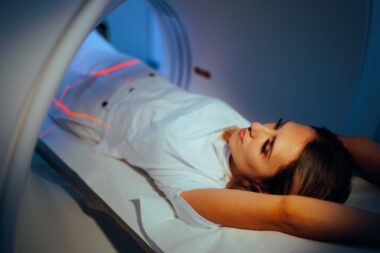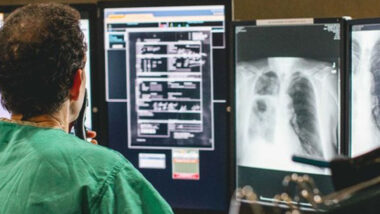Cancer detection has come a long way in the past few decades. Advances in technology have made it easier to screen for many types of cancers. This often leads to early detection of cancer, when it is often easier to treat. One such advance is the computed tomography scanner, more commonly called a CT scanner. The first use of this advanced form of X-ray imaging occurred in 1971 and the first whole-body scanner debuted in 1973.
CT scans make it easier for doctors to see possible tumors that otherwise might not be detected, making them a useful tool in diagnosing cancer.
Why You Might Need a CT Scan for Cancer
A mammogram is the best imaging exam to screen for signs of breast cancer, and a colonoscopy is the gold-standard method of looking for colon cancer. But many cancers are not easy to see on X-rays, and blood tests may show that something is off in your body but not necessarily what or where. If your doctor suspects cancer could be a potential cause of your symptoms, he or she may order a CT scan. This imaging not only can show a tumor’s shape, size and location, but it can even show the blood vessels that feed the tumor.
Symptoms of common cancers that could lead your doctor to order a CT scan include:
- Bloating or swelling
- Blood in your urine or stool
- Coughing, chest pain or shortness of breath
- Digestive problems that do not go away with routine treatments
- Fatigue
- Feeling a lump in your abdomen or side
- Persistent back, hip or pelvic pain
- Problems urinating
- Unexplained abdominal pain
- Weight loss for no reason
Another reason your provider might order a CT scan is to see how you are progressing after a cancer diagnosis. A CT scan can be a useful way to tell if your cancer treatment is working. Many people also have regular scans to check whether cancer has returned in the years following the end of treatment. A CT scan may also be used to see if cancer has spread elsewhere in your body.
Types of Cancer a CT Scan May Detect
One of the most common types of cancer detected by a CT scan is lung cancer. In fact, if you are a current or former heavy smoker aged 50 or older, your doctor may recommend you get annual low-dose CT scans to screen for lung cancer in its earliest stages. Compared to an X-ray, a CT scan does a better job of showing whether something that looks like cancer in your lungs is actually a tumor and not something else, like an abscess.
Additionally, CT scans are frequently used to detect many abdominal cancers, such as:
- Bladder cancer
- Kidney cancer
- Ovarian cancer
- Pancreatic cancer
- Stomach cancer
Some types of colorectal cancer may also show up on CT scans. Blood cancers such as lymphoma or leukemia may also appear on a CT scan if they have spread to the lymph nodes, liver or spleen.
In addition to or instead of a CT scan, your doctor may order other imaging, such as an ultrasound or MRI, which are commonly used to detect brain tumors. Supplemental imaging including breast MRI and ultrasound may also be added to screening and diagnostic exams for women considered to be at higher risk for developing breast cancer.
How a CT Scan Works
During a CT scan, you will lie flat on a table that slides on a track through a tube-shaped scanner. A CT scan requires you to hold your breath for a few seconds when the images are captured. Most CT scans take 10 to 30 minutes, depending on how many pictures your doctor wants and how many areas of the body he or she wants to look at.
Your scan may or may not require contrast — a brief IV injection that helps to create a clearer picture. Some people have an allergic reaction to contrast, so make sure to tell your doctor about your known allergies.
Although a CT scan exposes your body to ionizing radiation, the brief imaging sessions you need for diagnosis and treatment follow up are unlikely to seriously affect your risk of developing another cancer. CT imaging software is designed to deliver the lowest dose necessary to complete the scan, however, if you should not be exposed to any amount of radiation for certain reasons, such as pregnancy, an MRI may also be used for diagnostic cancer imaging.
Talk to your physician about any health concerns or symptoms you may be experiencing to determine if imaging is a next step. Carolinas Imaging Services provides advanced diagnostic outpatient imaging, including CT, MRI, ultrasound and X-ray. With multiple locations and easy scheduling, Carolinas Imaging Services makes it convenient for you to get a CT scan with a physician’s referral order. Don’t delay a diagnosis that could save your life.



